Sense of Entitlement Spans Generations
‘[btnsx id=”5768″]
https://coldcases.emory.edu/isaiah-nixon/
Sense of Entitlement Spans Generations
Supreme Court Chief Justice Roger Taney declared in 1857 that Black people “had no rights which the white man was bound to respect.”
His statement was controversial then and eventually repudiated, but more than a century later, many haven’t gotten the memo.
Journalists plan to investigate the reason why, Jill Nevels-Haun, editor of the Savannah (Ga.) Morning News, said at Sunday’s Journal-isms Roundtable.
Nevels-Haun was speaking after Hank Klibanoff (pictured), a former managing editor of the Atlanta Journal-Constitution and co-author of “The Race Beat: The Press, the Civil Rights Struggle, and the Awakening of a Nation,” made a vivid presentation of the work pursued by his Georgia Civil Rights Cold Cases Project.
I The Emory University project “engages undergraduate students in examining Georgia history through research into unpunished racially motivated killings that occurred in the state during the modern civil rights era.”
The Emory University project “engages undergraduate students in examining Georgia history through research into unpunished racially motivated killings that occurred in the state during the modern civil rights era.”
The project’s findings pushed some viewers to tears, as when one of Klibanoff’s students located the grave of Isaiah Nixon, a Black man who had been shot in his front yard in front of his wife and six children in Alston, Ga., on Sept. 8, 1948. Why? He had voted in the Georgia Democratic primary.
The grave was overgrown with dirt, leaves and fallen branches. Students in the class drove three hours, visited the cemetery, began walking the grounds – and found Nixon’s burial place. It was 2015. “I get chills listening to this,” said Detroit journalist — and now the city’s director of arts and culture — Rochelle Riley, after Klibanoff played some of his podcast about the case.
Others said they teared up, too.
Forty-eight people were on the Zoom call, with others watching on Facebook, and later, on YouTube. You can watch the YouTube video above or at < https://www.youtube.com/watch?v=0ZwX3LBclSY >
There was more emotion when Klibanoff mentioned Nixon’s neighbor Dover Carter, who in 1946 founded the Montgomery County, Ga., branch of the NAACP. A father of 10, Carter was brutally beaten with a tire iron and iron knuckles after he drove another Black neighbor to the polling place.
The manifestations of the mindset that enabled the murder of Nixon and so many others were evident in the 2020 killing of Ahmaud Arbery, a 25-year-old Black man, just outside Brunswick, Ga.
Greg McMichael and his son, Travis McMichael, armed themselves and pursued Arbery in a pickup truck after spotting him running in their neighborhood. William “Roddie” Bryan joined the chase and recorded cellphone video of Travis McMichael blasting Arbery with a shotgun.
The three white men were convicted of murder last fall in a Georgia state court, and last month were found guilty of federal hate crime charges.
Andale Gross, who heads the Associated Press race and ethnicity team, told the group that connecting the dots leads to a need for journalists to examine the mindset of racism. “I know folks are looking for answers to what happened here. It was just white supremacy . . . .
“The answers are kind of right in front of us all along,” Gross said, additionally citing the killings of Emmett Till in 1955 and Trayvon Martin in 2012. “You know racism is something we got to really continue to confront; be honest about it, write openly about it . . . not be afraid to ask the right questions about it, and continue to expose it. . . .
“These folks felt entitled and empowered to go after someone they felt did not belong . . . in that part of their community. A lot of people talk about former president Donald Trump emboldening people to be more open with this type of attitude. In this current era, you can’t put it all on Trump. It’s just embedded in the culture and in America and I think it’s starting to kind of become more mainstream. Sadly, I don’t think what we saw with Ahmaud Arbery will be the last of it.”
Nevels-Haun, who joined the Savannah news organization in October as executive editor, said of the so-called “cold cases,” “When I look at . . . the phenomenal work that Hank and his students has shared with us, the connection that I see between those cases just sort of shouts to me, those individuals, just as the individuals in the Amaud Aubrey case, felt as though they were justified in doing what they did.
‘” It was my right to do this.’ So what we’re looking at now, or we’re exploring a little deeper is, that sort of psyche that exists.
“What made them feel as though it was their right to hunt Ahmad Arbery down, to chase him and ultimately kill him?”
Nevels-Haun said that for reporters Raisa Habersham of the Savannah Morning News and N’dea Yancey-Bragg of USA Today, who collaborated on the Arbery coverage, “Our next step is to sort of explore that . . . .
“Why does this exist? You know I think Hank’s team showed us just in what we’ve . . . looked at. There’s a belief that it’s my God-given right to do this.
“But why? Why do you feel that way? “
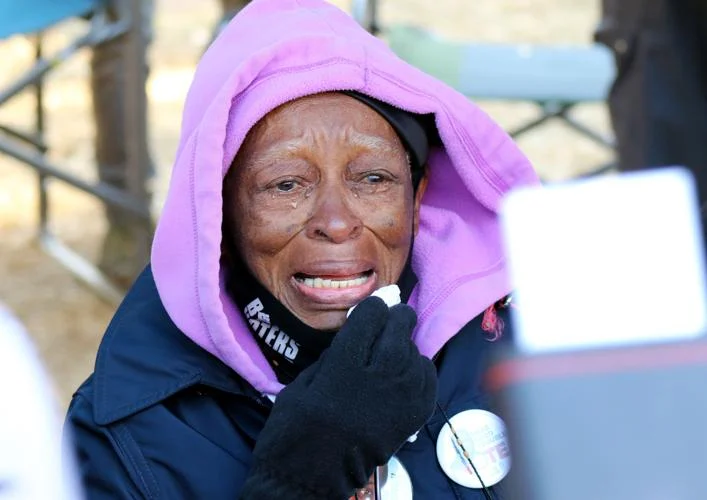
Beatrice Mcbride, who had been photographing the Arbery family for the Washington-based Transformative Justice Coalition for the last two years, told the group, “I spoke to a couple of [Black] guys and what happened to Ahmaud Arbery is part of their culture. They told me they were afraid of white men in pickups. If you saw white guys in pickups, you hid. You ran. Another guy told me he had to hide for two hours” because he was being chased. “So I guess it’s just part of the white racist culture. It just perpetuates itself and [they] thought that they could get away with it.”
Klibanoff had his own explanation, reached partly because he is an Alabama native. He was discussing A.C. Hall (pictured, below), 17, killed by police in Macon, Ga., in 1962 on the false charge that he had stolen a gun.
In one of the podcasts, Klibanoff asked Kenny Durden, son of James L. Durden, one of the officers was exonerated in Hall’s killing, about his father’s views on race and having Black friends.
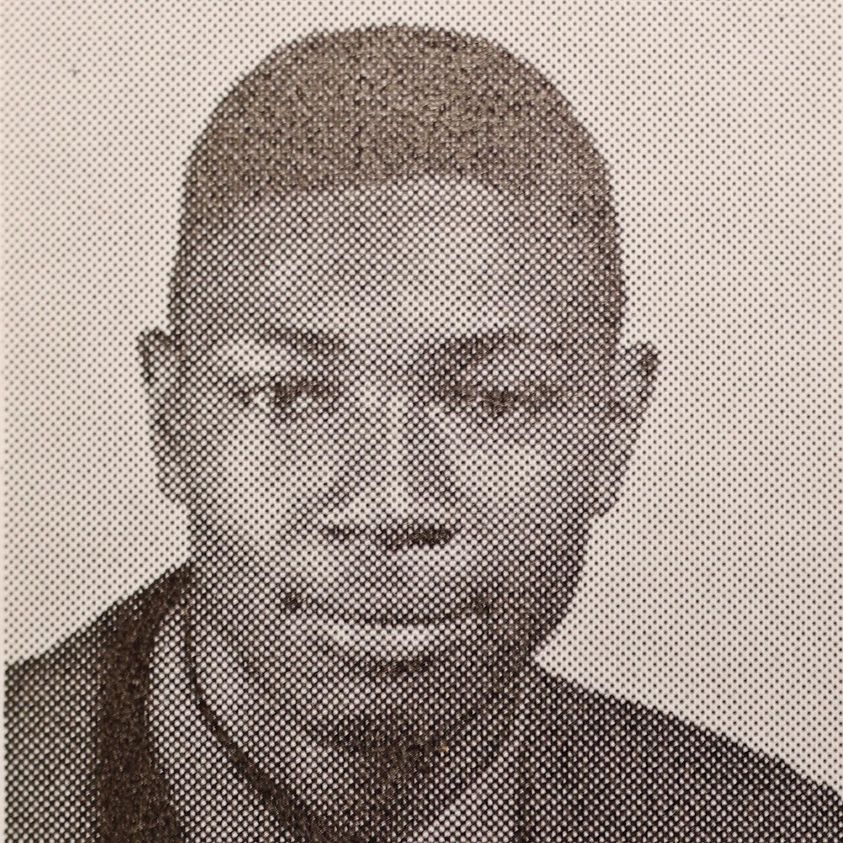 “He had Black friends that meant just as much to him as any white friend that he had,” the son said.
“He had Black friends that meant just as much to him as any white friend that he had,” the son said.
“But he did have a stigma about Black people, and I think it has to do with the way he was raised.
“He didn’t have anything against him but he didn’t want to mix and mingle with him.
“He expected them to stay with their kind, that he stayed more or less with his kind.”
Jerry Mitchell, founder of the Mississippi Center for Investigating Reporting, who has famously solved cold cases himself, said, the “Ahmaud Arbery case reminds me of the slave patrols that existed prior to the Civil War. Under the law, any white person had authority over anyone Black.”
The ancestors of Arbery’s tormenters were soldiers in the Confederacy and were slave owners in the 1800s, though, of course, racism is not congenital, Klibanoff said.
Yet, in a striking contrast, Klibanoff continued, one of Arbery’s ancestors was Bilali Muhammad, an enslaved Muslim who “could read, he could write. He was brilliant on agronomy.”
Muhammad left behind 13 pages of writings in Arabic that are now part of the University of Georgia’s Hargrett Library Rare Book unit.
The discussion prompted some Roundtable attendees to reflect on their own family history. Roger Witherspoon, a contributing editor to US Black Engineer & Information Technology, wrote in the chat room that in Petersburg, Va., in 1876, “Six klansmen came to my great grandfather’s house and shot him as he was at the family dinner table. He had four sons. Three of them, in separate shootouts, killed 15 klansmen. The oldest died.”
Witherspoon also wrote, “I was taught it was a story about standing up for yourself and your family. Further, if the klan ever came for you, make sure you killed so many that they would think twice about attacking another Black man. I was 10 when Dad and Grandpop sat me down and told me I had an obligation to kill klansmen.”
In 1966, “I was 17 when I integrated the U of Mich College of Engineering and the state klan ordered me killed. Because of those stories, I wasn’t afraid of them, I and my Jewish roommate, armed with a [bayonet] and a [Bowie] knife, went after 45 klan and nazis one long night that ended with the [leader] of the nazis tossed out the window of the dorm.”
Among the attendees were Michelle and Dan Duster, great-grandchildren of the journalist and anti-lynching crusader Ida B. Wells. The Dusters had issued a statement praising the March 7 passage of the Emmett Till Anti-Lynching Act. Also present was Buddy Hughes, managing editor of the Brunswick News, the local paper for the area where Arbery was killed.
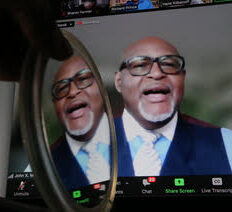 We toasted John X. Miller (pictured, by Sharon Farmer), who has left The Undefeated, now called Andscape, to join the Dallas Morning News as senior editor working with sports, entertainment and business, “with a focus on DEI,” acronym for diversity, equity and inclusion.
We toasted John X. Miller (pictured, by Sharon Farmer), who has left The Undefeated, now called Andscape, to join the Dallas Morning News as senior editor working with sports, entertainment and business, “with a focus on DEI,” acronym for diversity, equity and inclusion.
“Please hit me up because I’m there to be a disruptor . . . to make some change in a newsroom, working for Katrice Hardy, one of the new Black female editors in America and we’re gonna do the thing,” Miller said.
Berry said of Poussant that despite “all of her exceptional gifts,” her success was limited because she was a Black woman. “Imagine Renee as a man with all of her wonderful gifts.”
Lynne Adrine, who worked at WJLA-TV as her first job out of graduate school, told the Zoom that “Paul is being modest. He and Renee put up with a lot of crap from the then-owners of Channel 7.” Adrine used the words “apartheid” and “bunker mentality.” Berry acknowledged that, “It was not an easy place to work.”
Stitt of WPFW-FM noted an upcoming 24-hour tribute to Muhammad, who was news director and a program host, on his birthday, this coming Tuesday, March 28. It will include a version of the Journal-isms Roundtable, with Black columnists discussing the significance of that set of journalists and Muhammad’s place among them.
- Russ Bynum, Associated Press: Attorneys: Ex-Prosecutor Never Hindered Arbery Investigators
- Madi Olivier, Emory Wheel: Emory faculty confirmed to serve on White House Civil Rights Cold Case Records Review Board (Feb. 23)
Black News Channel Closes After Two Years
March 25, 2022
‘Unable to Meet Financial Goals’
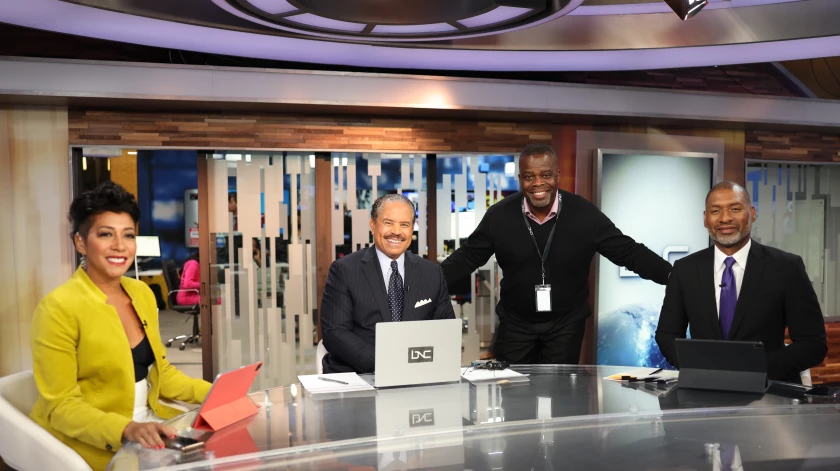
‘Unable to Meet Financial Goals’
Black News Channel announced Friday that it is ceasing operations immediately, with CEO Princell Hair telling employees that, “Unfortunately, due to challenging market conditions and global financial pressures, we have been unable to meet our financial goals, and the timeline afforded to us has run out.
“It’s with a broken heart that I am letting you all know that, effective immediately, BNC will cease live production and file for bankruptcy. We are saddened and disappointed by this reality and recognize the stress that this puts on you and your families.”
The Friday afternoon announcement followed reports throughout the morning that the network’s demise was imminent. It was the latest attempt at a cable news network targeting Black people, undertaken as Black Entertainment Television and TV One all but abdicated their news obligations, save for an occasional news special.
Live programming “will end at 2 p.m. PDT/5 p.m. EDT. The channel will air repeats for the rest of the month,” Stephen Battaglio wrote for the Los Angeles Times.
He also wrote, “The announcement means BNC’s staff of 230 — a vast majority of whom are people of color — are out of work. They have been told benefits will last through next week and there will be no severance, according to one person briefed on the plans.”
Antoinette Siu reported for The Wrap, “The network, whose majority stakeholder is Jacksonville Jaguars owner Shad Khan, has struggled to draw viewers or generate buzz. (Last November, the Los Angeles Times reported that Khan invested $50 million dollars in the channel.) In December, just days before Christmas, the channel laid off at least 80 staffers. More cuts followed and remaining employees who were not under contract began to bolt. Insiders have told TheWrap the network has shed more than 120 staffers since Christmas. . . .
“A Nielsen ratings analysis compiled by TheWrap in 2021, found of 124 cable news channels, BNC came in 123rd with an average of 4,000 viewers on any given show. Fox News was No. 1 with an average 2.361 million primetime viewers each evening.”
The National Association of Black Journalists issued a statement, “NABJ is exploring ways to assist our members impacted by the closing. We encourage members to explore job opportunities across the industry through our NABJ Career Center at NABJCareers.org and sign up for our specialty databases,” providing separate links for producers, editors and freelancers.
In the Wall Street Journal, Lillian Rizzo wrote that “Under Mr. Hair’s leadership, BNC landed distribution deals with most pay-TV providers, including Comcast Corp.’s Xfinity, Dish Network Corp. and DirecTV. The network said it reached roughly 50 million households.
“BNC didn’t receive fees from distributors for carrying its channel, according to one of the people familiar with the matter. Instead, the network relied on advertising revenue and funding from its backer — a practice that is commonplace for most upstart cable channels.”
“The network’s viewership hit a peak of 80,000 this week, according to Nielsen data, as it aired wall-to-wall coverage of confirmation hearings for Judge Ketanji Brown Jackson, the first Black woman nominated to the Supreme Court. . . . .”
Roland Martin, who produces his own digital show, told Rodney Ho of the Atlanta Journal-Constitution, “The cash outflow was too large combined with a lack of ratings. It’s highly unfortunate. You have a lot of Black journalists committed to this concept but at the end of the day, business is business.”
“BNC focused on a linear cable network in a day and age where streaming, YouTube, podcasts and social media are ascendant. Martin said it would have been smarter if they had started as a digital channel and invested in a handful of big names instead of running news throughout the day. The model they chose was simply too expensive, he said,” Ho wrote.
Hair’s note to colleagues reads:
“A little more than two years ago, the lights on BNC’s cameras flipped on for the first time. Despite the challenges of a global pandemic, we launched a groundbreaking mission to inject positive change into a news landscape that, for far too long, had underserved and overlooked Black and Brown people.
“During the past few months, we have endured very painful workforce reductions at all levels of the network as we worked to achieve our financial goal of a break-even business. This has forced all of you to do more with less, and your contributions have been remarkable.
“Unfortunately, due to challenging market conditions and global financial pressures, we have been unable to meet our financial goals, and the timeline afforded to us has run out.
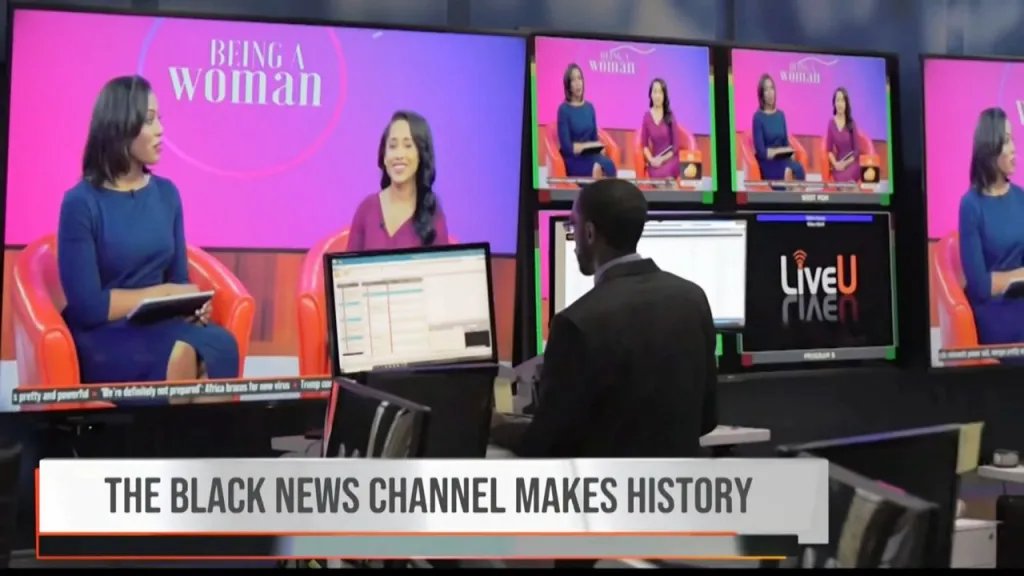 “It’s with a broken heart that I am letting you all know that, effective immediately, BNC will cease live production and file for bankruptcy. We are saddened and disappointed by this reality and recognize the stress that this puts on you and your families. (Photo: Two years ago at the channel’s debut.)
“It’s with a broken heart that I am letting you all know that, effective immediately, BNC will cease live production and file for bankruptcy. We are saddened and disappointed by this reality and recognize the stress that this puts on you and your families. (Photo: Two years ago at the channel’s debut.)
“With the nation on the verge of a social justice reckoning not seen in this country since the Civil Rights era, we’ve been hard at work building our presence in the marketplace with unprecedented speed. Through a continuous run of distribution agreements on both linear and streaming platforms, BNC’s accessibility has grown to reach more than 250 million touchpoints.
“Since rebranding and relaunching the network a year ago, we have developed a 17-hour daily block of live programming and a lineup of shows that are outstanding. Every day we present stories, context and viewpoints that illuminate and celebrate the Black experience in a way that no other network has since the dawn of television.
“We have hired more than 250 Black journalists and Black production personnel, and all your hard work and dedication has lifted this network to incredible heights. There have been countless wins along the way, including gavel-to-gavel coverage of several trials that gripped our community, A-list guests throughout our dayparts and exclusive coverage of The Congressional Black Caucus’ first-ever response to the President’s State of the Union address. Just this week we set an all-time viewership record for the network during wall-to-wall coverage of Judge Ketanji Brown Jackson’s U.S. Supreme Court confirmation hearings.
“I understand that this surprising and unfortunate news will naturally generate a lot of questions surrounding next steps. Our leadership team and human resources will be in touch to address them over the coming days and weeks.
“Please know that I am very thankful for all of your hard work and deep commitment to our mission. We have differentiated ourselves, and your achievements over these last two years should be an immense source of pride that you will carry throughout the rest of your careers.
“In the meantime, please take care of yourselves and each other, and remember that we built something great here. BNC, or something very close to it, will surely return at some point, because the world needs it, and all of you have proven it can be done.”
The Tallahassee Democrat provided this timeline:
The Rise and Fall of the Black News Channel:
- Black News Channel, based in Tallahassee, looking at Atlanta as future HQ location
- Black News Channel thriving under new President and CEO Princell Hair
- Black News Channel names South Florida native as new president, CEO
- Black News Channel launches from Tallahassee, despite absence on Comcast Xfinity, Dish Network
‘[btnsx id=”5768″]
To subscribe at no cost, please send an email to journal-isms+subscribe@groups.io and say who you are.
Facebook users: “Like” “Richard Prince’s Journal-isms” on Facebook.
Follow Richard Prince on Twitter @princeeditor
Richard Prince’s Journal-isms originates from Washington. It began in print before most of us knew what the internet was, and it would like to be referred to as a “column.” Any views expressed in the column are those of the person or organization quoted and not those of any other entity. Send tips, comments and concerns to Richard Prince at journal-isms+owner@
View previous columns (after Feb. 13, 2016).
View previous columns (before Feb. 13, 2016)
- Diversity’s Greatest Hits, 2018 (Jan. 4, 2019)
- Book Notes: Is Taking a Knee Really All That? (Dec. 20, 2018)
- Book Notes: Challenging ’45’ and Proudly Telling the Story (Dec. 18, 2018)
- Book Notes: Get Down With the Legends! (Dec. 11, 2018)
- Journalist Richard Prince w/Joe Madison (Sirius XM, April 18, 2018) (podcast)
- Richard Prince (journalist) (Wikipedia entry)
- February 2018 Podcast: Richard “Dick” Prince on the need for newsroom diversity (Gabriel Greschler, Student Press Law Center, Feb. 26, 2018)
- Diversity’s Greatest Hits, 2017 — Where Will They Take Us in the Year Ahead?
- Book Notes: Best Sellers, Uncovered Treasures, Overlooked History (Dec. 19, 2017)
- An advocate for diversity in the media is still pressing for representation, (Courtland Milloy, Washington Post, Nov. 28, 2017)
- Morgan Global Journalism Review: Journal-isms Journeys On (Aug. 31, 2017)
- Diversity’s Greatest Hits, 2016
- Book Notes: 16 Writers Dish About ‘Chelle,’ the First Lady
- Book Notes: From Coretta to Barack, and in Search of the Godfather
- Journal-isms’ Richard Prince Wants Your Ideas (FishbowlDC, Feb. 26, 2016)
- “JOURNAL-ISMS” IS LATEST TO BEAR BRUNT OF INDUSTRY’S ECONOMIC WOES (Feb. 19, 2016)
- Richard Prince with Charlayne Hunter-Gault, “PBS NewsHour,” “What stagnant diversity means for America’s newsrooms” (Dec. 15, 2015)
- Book Notes: Journalists Follow Their Passions
- Book Notes: Journalists Who Rocked Their World
- Book Notes: Hands Up! Read This!
- Book Notes: New Cosby Bio Looks Like a Best-Seller
- Journo-diversity advocate turns attention to Ezra Klein project (Erik Wemple, Washington Post, March 5, 2014)
When you shop @AmazonSmile, Amazon will make a donation to Journal-Isms Inc. https://t.co/OFkE3Gu0eK
— Richard Prince (@princeeditor) March 16, 2018
![]()

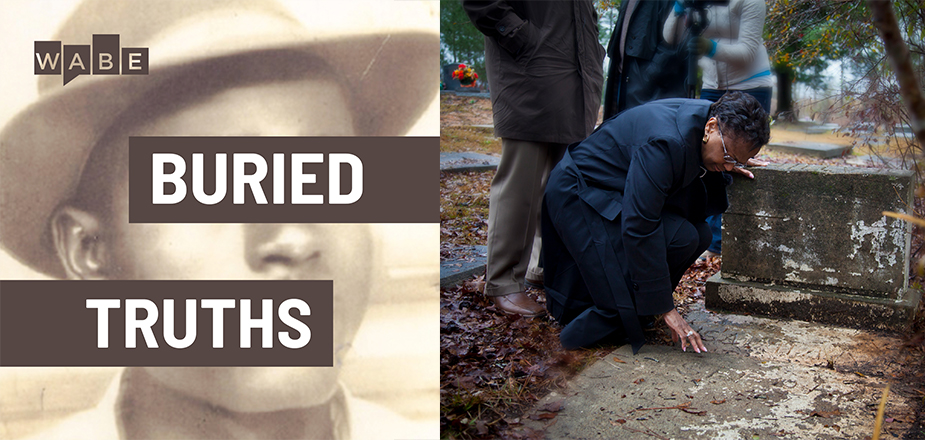
7 comments